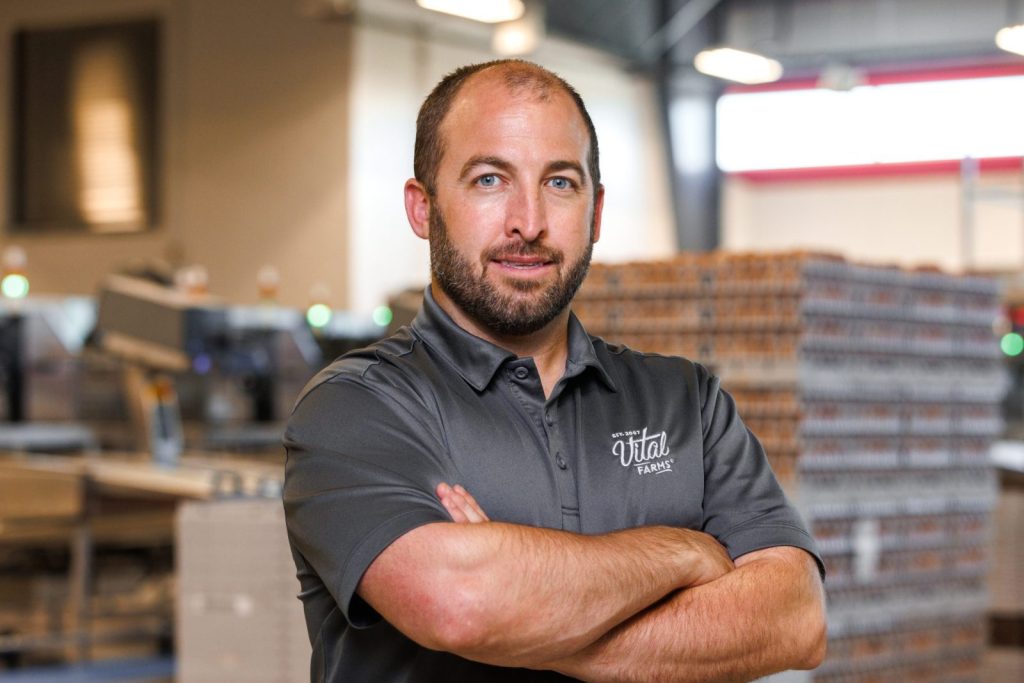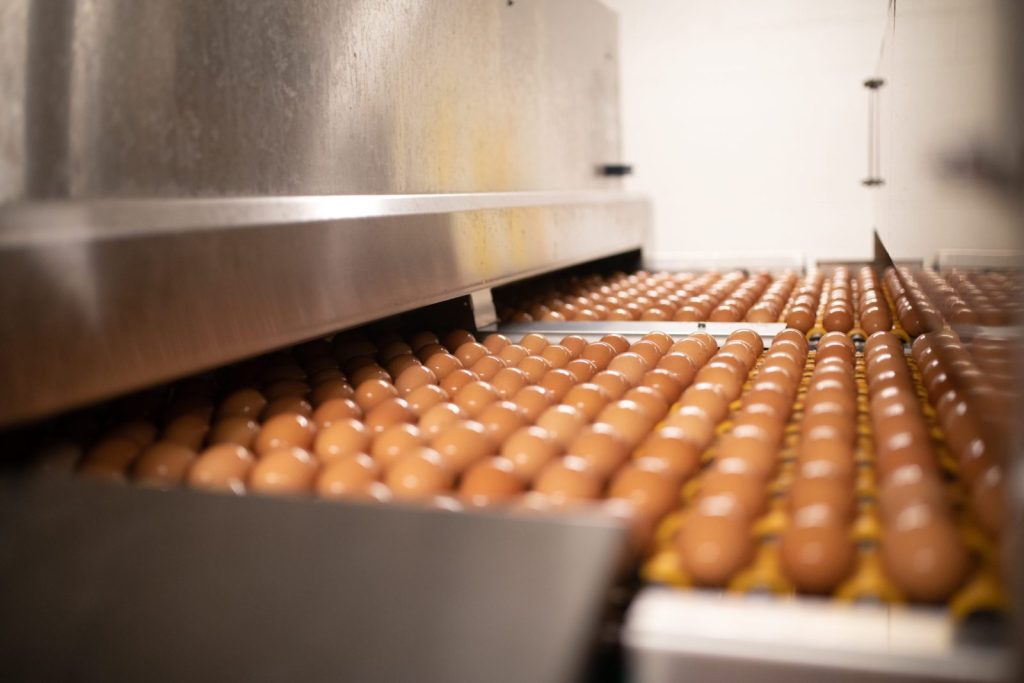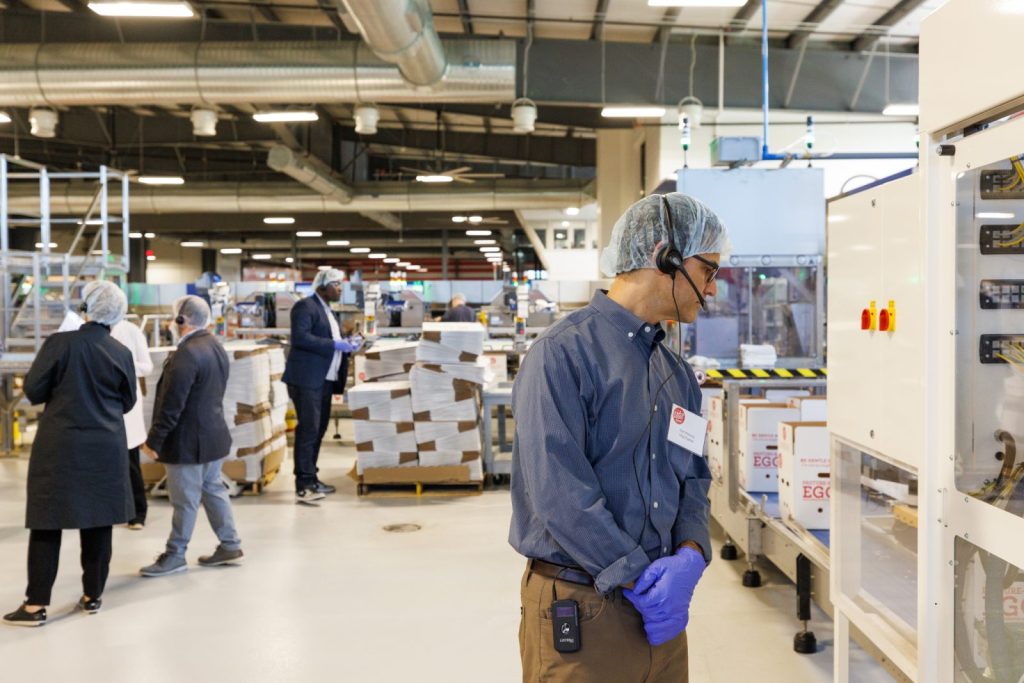A Springfield egg processing plant is in the national spotlight for its environmentally friendly way of doing business.
Vital Farms’ facility, called “Egg Central Station,” was recently named Food Processing’s 2022 Green Plant of the Year. The Springfield plant processes 6 million eggs a day while staying committed to sustainability, according to the award announcement.
The 150,000-square-foot operation employs about 200 people in Springfield. The property has many modern, eco-friendly features, like water-saving “retention ponds” and smart lighting systems.
Carl Kicklighter, director of plant operations, views being named Green Plant of the Year as a way to spread the message to other businesses: you don’t have to choose between being profitable and being sustainable.

“We are an example of where you can do both,” Kicklighter said. “I’m hoping more companies will maybe take a page out of that book and see that if we are not good stewards of the planet — if we are net takers, if you will — there probably won’t be a whole lot left for generations after us.”
Founded 15 years ago, Vital Farms contracts with a network of over 275 family-owned farms that practice sustainable agriculture and pasture-raised chickens and cows for its eggs, butter and ghee products. You might recognize their black egg cartons at the grocery store — their eggs are sold in 21,500 retail spots.
Company’s green features found inside and outside building
The company’s egg processing plant, known as Egg Central Station or the ECS, is located in northwest Springfield at the industrial park near the airport.
While the list of sustainability and earth-friendly measures taken by the company is long and can be viewed in its 2022 Sustainability Report, Kicklighter talked about a few of the more unique features at Egg Central Station.
Kicklighter said the company’s sustainability and planet-friendly efforts can be spotted when someone pulls into the parking lot.
“Something you will notice from outside is our landscaping,” he said. “We do not have your typical manicured lawn that requires a ton of moving and irrigation systems.
“Our facility is considered a greenfield build, which the easiest way to describe is that if you were to just completely remove the facility, all the landscape would go back to the native configuration,” Kicklighter explained. “We’ve got a lot of native grass, a lot of tall what some may refer to as weeds out there. We do not have an irrigation system so we are not using thousands of gallons of water to water the grass and then turning around and mowing it.”

The parking lot, too, was designed with sustainability in mind. It’s made of pavers with retention ponds underneath. And the roof is slanted with retention ponds beneath.
The retention ponds collect the rainwater and then allow it to seep back into earth at a natural pace. The ponds can hold up to 700,000 gallons of water, Kicklighter said.
“That is super important when it comes to water runoff,” he said. “Most of your facilities want a concrete (or) blacktop. You get those real strong southwest Missouri rains and it just all washes off the backside of your property.”
Then step inside the building and notice the automated blinds and the abundance of natural lighting when and where possible.
“We take a reading of the sun every 20 minutes in the admin area, our front offices and break rooms,” Kicklighter said. “We use that reading to either raise or lower the blinds to make sure we get that right balance of artificial and natural light. Throughout the day every 20 minutes, you’ll see the blinds adjust automatically.”
In all areas of the facility, the lights have motion sensors. If an area of the plant is not being used, the lights automatically turn off.
Water conservation important when washing 6 million eggs a day

Another sustainable way of operating is the egg-washing process.
“It takes a lot of water to wash 6 million eggs, and so we try to be especially mindful of how we are using that water and the rate we are using that,” Kicklighter said. “We’ve got a water circulation system, if you will, that helps us clean and recycle that water.
“We get about four hours of use out of that water before we have to dump that water and then replenish with new,” he said. “That becomes especially important when you are trying to wash 6 million eggs. Every hour that we can preserve that water is super important.”
The eggs are stored at Springfield Underground, a massive cold storage facility on the east side of town. This allows the eggs to be cooled with 25 percent less energy than usual, according to the sustainability report.
The plant is a “zero food waste facility,” meaning all excess egg product is used for other purposes such as pet food.
These are just a few of the sustainability measures the company uses. And according to Kicklighter, they weren’t all implemented from the beginning — something he’d like other companies to note when considering taking steps to be more environmentally friendly.
“This has been a journey for us and it continues to be a journey,” he said. “There’s a lot of pressure from the economic standpoint of things and businesses are under a lot of pressure to stay profitable.
“There are models out there that work, where you can be very green-conscious, you can be good stewards of the environment, you can treat your people right,” Kicklighter continued. “And you can exist to improve the lives of people, animals and the planet and still be a profitable business.”
The Springfield Egg Central Station plant opened in 2017.

A commitment to the ethical treatment of animals
Kicklighter said company’s stated purpose is to “improve the lives of people,
animals and the planet through food.”
Obviously the chickens and cows — the girls, as they are lovingly called — are an important part of that, he said.
“Most girls in the United States, most of the chickens in the egg industry, are raised in cages,” he said. “All of our birds are pasture raised. The birds are an important part of our business. They are a core stakeholder in our business. We think it’s important they have a good lifestyle too. It’s not just about cranking out as many eggs as they can.
“All of our chickens are raised on small family farms, You are not going to see big corporate barn systems with millions of birds on them,” he said. “These are all small family farms that honestly provide better care. … The cows, too.”
Vital Farms’ network of farms are located throughout the middle of the United States (including Missouri, Kansas, Arkansas and Kentucky). This portion of the country is what Vital Farms refers to as the “Pasture Belt,” a region of the U.S. with a more temperate climate that allows the chickens to be outdoors year-round, according to information in the sustainability report.
Each “hen receives at least 108 square feet of pasture on which they have the freedom to roam and forage during the daytime for natural food sources like native grasses and insects,” the report says. “This contrasts with how most egg-laying hens in the U.S. are treated, which includes confinement in battery cages or cage-free conditions where they live in large flocks and rarely or never go outside.
“With over 275 farms in our network, we’re enabling over 3.4 million hens to live a life outdoors on pasture, free of confinement,” the report says.
Interested farmers meet with staff from Vital Farms to make sure they “share the same commitment to environmental and animal welfare.” Staff also surveys the farmland. If the farmer is a good fit, Vital Farms provides comprehensive training that “focuses on farm management, including hen handling, nutrition and pasture rotation.”
Vital Farms provides farmers with continued support, including weekly phone calls, in-person meetings and veterinarian support.
Vital Farms relies on a network of family dairy farms for the cows that produce the cream used for the company’s butter and ghee. According to the report, these are farmers “who embrace rigorous animal welfare standards.”
The report says those dairy farmers must follow the “Five Freedoms of animal welfare” to support their mental and physical well-being. These Five Freedoms are recognized as the gold standard for animal welfare.
The Five Freedoms include: freedom from hunger and thirst; freedom from discomfort, pain, injury or disease; freedom from fear and distress; freedom to expresses their natural behaviors (socialize with their herd, have plenty room in the barns to eat, drink and lie down in a clean, dry space whenever they want).
Learn more about Vital Farms on its website.

